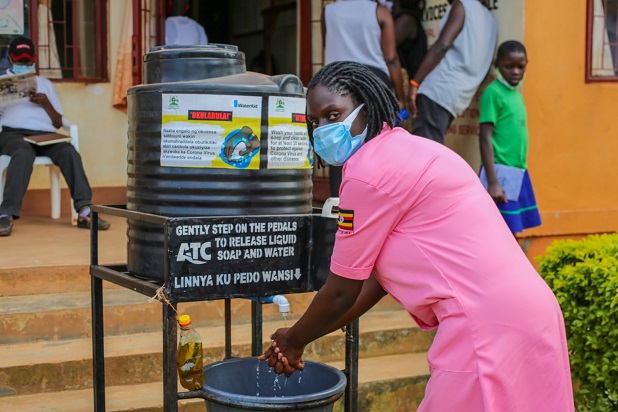A nurse washes her hands at a healthcare facility
As Uganda joins the international community to celebrate the Global Hand Washing Day, WaterAid Uganda calls upon education institutions, healthcare facilities and business establishments such as restaurants, taxi parks and market centres to prioritise provision of hand washing facilities, in order to stop the spread of infectious diseases, such as diarrhoea, respiratory infections, cholera, Ebola and Mpox.
UNICEF reports that diarrhoea, a leading cause of childhood mortality in Uganda, claims the lives of 33 children daily. Additionally, school-going children frequently miss classes due to infectious diseases, while healthcare workers and mothers in hospital settings face constant risks of acquiring infections associated with healthcare environments. Recently, the Uganda Virus Research Institute reported cases of Mpox, which has been subsequently classified as Public Health Emergency by the Ministry of Health and Global Public Health by the World Health Organisation.
“Handwashing, especially at key times such as after using the toilet, when preparing food and before eating, are the first line of defence against the spread of diseases, but it all starts with fixing handwashing facilities at key points such as within toilet rooms at restaurants, market centres, taxi parks, schools, and healthcare facilities.” Says Dr Joyce Mpalanyi Magala, the Country Director of WaterAid Uganda.
“Handwashing with soap is the easiest, inexpensive, and yet most effective ways to stop the spread of pathogens, maintain health, avert preventable death and exorbitant healthcare expenses that can impose significant financial burden on families and public health institutions, Dr Magala emphasises.
According to Mr. Daniel Lukooya, WaterAid’s Public Health Advisor, when hands come into contact with germs—such as after using the toilet or handling contaminated materials—and are not washed with soap, these germs can be transmitted from one individual to another, through handshakes, handling foods and caring for babies. That’s why clean hands are still important, a theme for this year’s Global Hand Washing Day.
Statistics from Uganda Demographic Health Survey 2022 Report, show that the percentage of households in urban areas with a place for hand washing with soap and water was 55%, and with water only was 19%. In the rural areas, 36% of households had a place for hand washing with soap and water, and 23% had a place with water only. Among the key sanitation and hygiene indicators, the percentage of households with improved sanitation facilities was 33% for Urban and about 30% in Rural areas.
This shows that sanitation and hygiene are still a big challenge especially in the rural dwellings, a stuck reminder that inequalities abound between rural and urban duellers, but also between men and women, where due to their role as mothers, primary care givers responsible for domestic chores and attendants in healthcare facilities, means that women and children are the most impacted, when handwashing services are suboptimal in such spaces.
WaterAId Uganda community initiatives focus on providing access to clean water, proper sanitation facilities, and hygiene education in schools, healthcare centres, and community hubs. Consequently, we have observed significant improvements, including higher school attendance rates and an increase in mothers seeking antenatal care.
WaterAid Uganda, therefore, calls upon all educational institutions, healthcare providers, and businesses to prioritize the establishment of handwashing stations at service points, not just as a reactive measure during disease outbreaks, but as a normal-proactive approach to sustainability and social responsibility.





